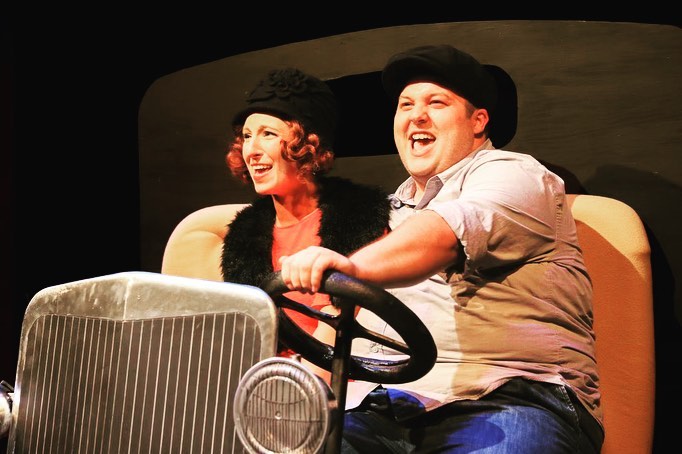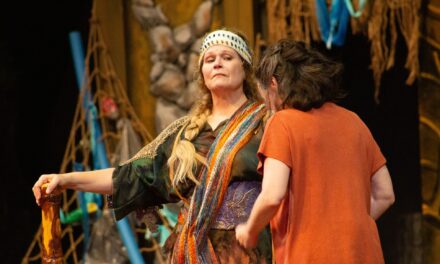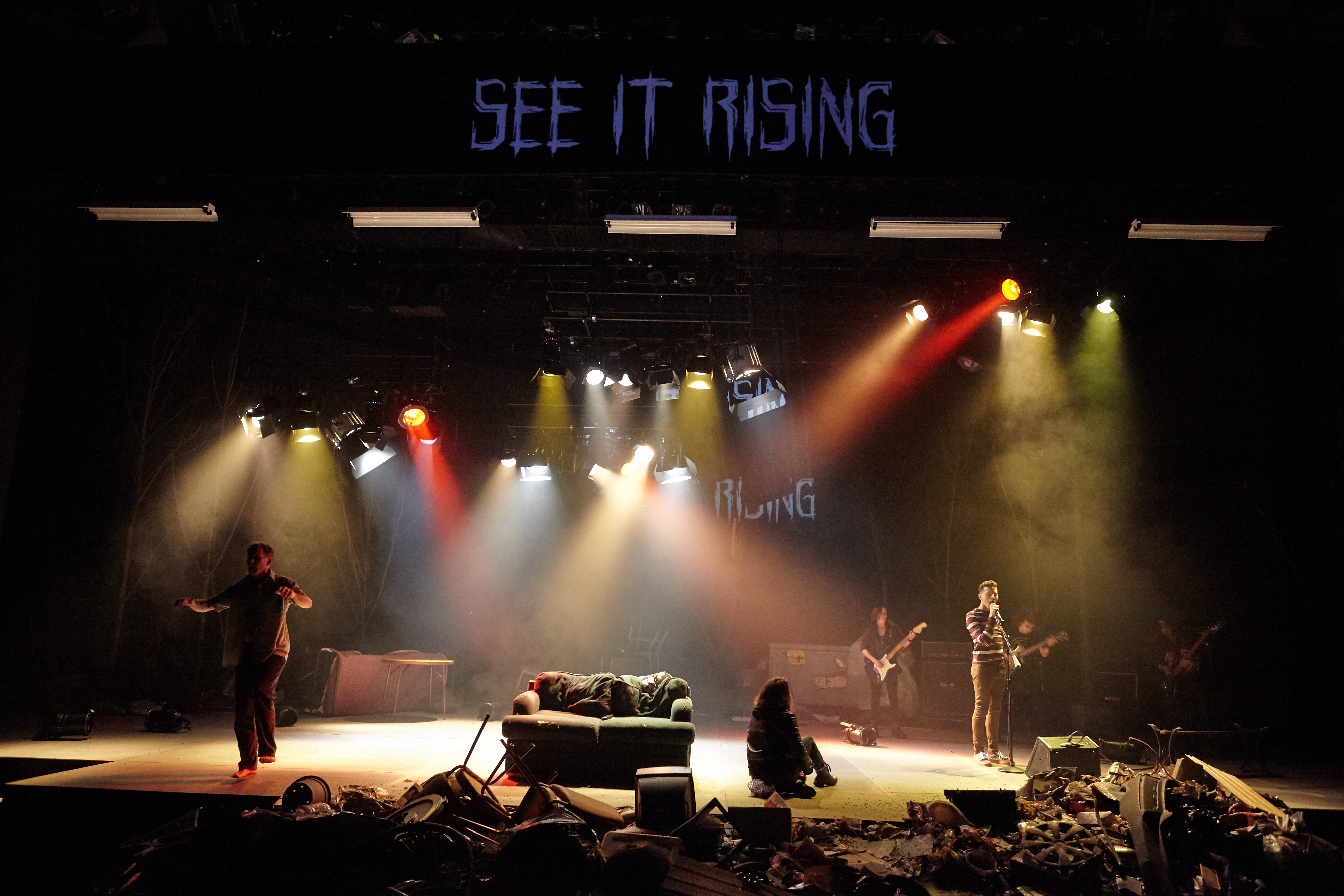Taylor Kearschner & Jareth Gaddis in Bonnie & Clyde. Photo: Dan Canon
Bonnie & Clyde
Book by Ivan Menchell
Lyrics by Don Black, music by Frank Wildhorn
Directed by Jennifer Starr
A review by Tory Parker
Entire contents are copyright © 2023 by Tory Parker. All rights reserved.
When Bonnie Parker grows up, she wants to be a star, like Clara Bow. When Clyde Barrow grows up, he wants to be an outlaw, like Billy the Kid and Al Capone. When we meet them at the beginning of the play, lying bloodied in the front seat of a car, both of their dreams have come true, and they’re both dead.
I wasn’t sure what to expect from the Bonnie and Clyde musical. It wasn’t a major success when it premiered, and I think it remains in the conversation because a handful of the songs have staying power, and because the leads went on to far more famous (and infamous…) roles. But I certainly didn’t expect it to be a clever, if sometimes heavy-handed, narrative on the nature of “crime” in America, and the relentless fallacy of the “American Dream.”
But it is that! And it might go so far as to let our leads off the hook sometimes, but it first and foremost is trying to explain how these two relatively unexceptional kids from the middle-of-nowhere, Texas managed to become two of the most infamous criminals in American history.
Jareth Gaddis as Clyde brings a delicious and necessary charm to the role, and his inherent charisma makes it easy to see why someone as desperate for a spotlight as Bonnie would fall in love with him. Gaddis, and Barrow ostensibly, give off that kind of energy that feels like a ray of burning sun. His brash bravado goes nicely with Taylor Kearschner’s demure, wide-eyed naivity as Bonnie. They make sense as a couple, but of course they do—they created this archetype.
Clyde’s brother, Buck (Erik Moth), is trying to get back on the right side of the law with help from his wife, Blanche (Ashley Drury), and a raucous Baptist congregation, led by Dustin Behr as the preacher. As much as the heat of Bonnie and Clyde might be titillating, we know everything about them is doomed. Blanche and Buck, played with humor, heart, and a confident trust by Drury and Moth, are the real tragic characters. Maybe they had a real chance at a happy, serene life. But maybe no one in their town did, thanks to the dying crops, the busted economy, and the rampant, omnipresent violence.
This production is thoughtful and nimble—it’s a big show to cram into a space like the Mex—and it is people-centered, as is to be expected and applauded coming from director Jen Starr. I appreciated the projection of historical photos, grounding us in the history and reality of this story. I recently saw this same effect utilized in the Broadway production of Parade and loved it; it grinds all fantastical thinking to a halt. These were real people, this was real violence. There were definitely some projections that could have been left out—we didn’t, for example, need a collage of hearts during the love ballad or a picture of cell bars during scenes set in a jail. But I tend to be a bit of a projection-hater, so if that helps you get into the scene, I’m not going to yuck the yum, but I think it tends to distract from the performances.
And there are some excellent performances to enjoy! Seth Sheffield as Ted, the policeman soft for Bonnie, absolutely shines. His voice is amazing, and when he, Moth, and Gaddis get to sing in a beautiful tenor trio, it’s a high point of the show, musically. (Bonnie & Clyde came out in the early 2010s, a time of inescapable tenor-supremacy, and we are still bearing the after-effects to this day.) Arianna Hart, Rachel Street, and Caitlyn Long bring a bubble of energy to the stage and are a delight to watch, especially alongside Moth and Drury. The whole ensemble is strong, if underutilized (by no fault of this production specifically). Bonnie & Clyde was designed to be a star-maker, and our titular characters do a solid job of holding the spotlight.
This show is a scary premise to consider as we ramble towards a major economic recession. America is a violent, bloodthirsty country at the best of times, and despite what conservative pundits and white people over 70 will tell you, there has never really been a “best of times.” When kids and young people who are promised a bright future, a full plate, a good home, and an easy life watch that promise break over and over and over, they get desperate. Bonnie Parker and Clyde Barrow met at ages 19 and 20 and were dead less than 5 years later. They took plenty of people down with them in that short time. The sensationalist American media, our own thirst for violence, and our delight in the exceptional made these children immortal, but it killed them all the same.
Featuring Jareth Gaddis, Taylor Kearschner, Erik Moth, Ashley Drury, Bernie Stone, Greg Collier, Faith M. Muller, Sean Turley, Seth Sheffield, Dakota Uselton, Eden George, Dustin Behr, Floren K, Mark Merk, Gabe Petri, Arianna Hart, Rachel Street, Caitlyn Long, Roscoe Henning, Jayden Baumgardner, Taylor Clemons
Bonnie & Clyde
August 18 – 27, 2023
Mind’s Eye Theatre Company
MeX Theatre at Kentucky Center
501 W Main Street
Louisville, KY 40202
Tory Parker, originally from West Virginia, is now a proud Kentuckian as well. In Louisville, she’s worked and/or performed with Actors Theatre of Louisville, Claddagh Theatre Company, the Chamber Theatre, Bellarmine University, Wayward Actors Company, Derby City Playwrights, Company OutCast, SHOTZ, Highview Arts Center, and director Emily Grimany. She is a co-founding artist of the queer theatre collaborative, three witches shakespeare. As a playwright, her full length drama, Recommended for You, appears in Stage It and Stream It: Plays for Virtual Theatre, and her original works have appeared in the National Women’s Theatre Festival Fringe Festival.





